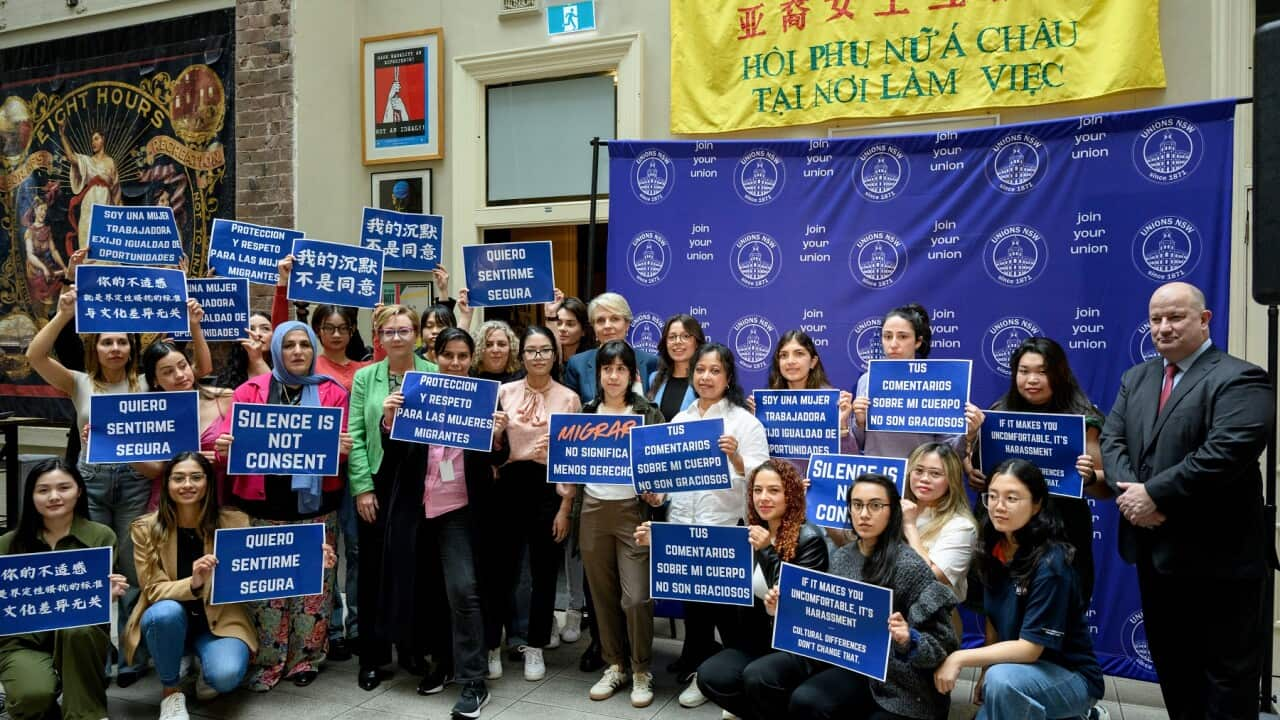TRANSCRIPT
A new report has found 51 per cent of migrant women workers nationally have experienced sexual harassment at work across multiple industries.
The highest rate was in the construction industry where more than four in five - or 82 per cent - of the respondents reported workplace sexual harassment.
This was followed by 53 per cent in the horticulture industry, 51 per cent in hospitality, 50 per cent in retail and 42 per cent in the cleaning industry.
Unions New South Wales conducted the research over a 12-month period, capturing the stories of more than 3,300 women in the last six years who were on a temporary visa at the time.
The report has been launched by Environment Minister Tanya Plibersek and New South Wales Minister for Women, Jodie Harrison.
It found women on temporary visas don’t think their employers are doing enough to protect them, and a significant number of women walked out of their jobs because they felt they were in danger.
The Secretary of Unions New South Wales, Mark Morey, says most of those women did not report the crime.
"75 per cent of those workers who have been sexually harassed said to us that they didn't report it because there was a fear of losing their visa or having their visa cancelled, fear of not having a job. And so sexual harassment for women on visas is massively under-reported."
Linh is a 19-year-old international student.
She worked in the hospitality industry.
"The owner of the business would scream at us and call us racist names amongst staff, in front of the customers. It got to the point that the behaviours of the abuse and exploitation were normalised at this workplace, and that customers would have a good laugh when the owner did that to us."
She experienced sexual harassment routinely at work, saying it became a part of her job.
Ms Do says on one occasion she had approached the senior owner at her workplace for extra work hours.
"He responded to my request positively, promising me that he would get me extra hours and extra shifts. He asked me to come see him the next morning so we can discuss (it). I was very excited. I came in the next day to see him. He offered to sit at a nearby cafe away from his family so he could better support me and I trusted him. As I was in the car, the first thing he did was he grabbed my face and kissed me right on my lips."
Linh says she froze - she wasn't sure if it was a cultural difference at that point.
"He started driving away. As I was anxiously looking forward to the arrival of a local cafe, I soon realised that the routes were unfamiliar to me. It was longer than he said it would take. I firmly asked him where he was thinking of taking me, and if we would still discuss about my hours."
He didn't give her a clear answer.
Linh felt unsafe and told him she wanted to go home.
"He immediately became aggravated. I was shocked to see that reaction from him. I was very scared. All these terrifying feelings, you name it, I experienced them all. He pulled over and quickly put his hands on my upper and lower private parts. At that very moment all of my doubts were confirmed. He was taking advantage of me and that I was sexually assaulted by my employer."
She did what she could to leave the car safely and flee, describing the way back home that day felt like 'forever'.
"I returned to work in the evening because I realised I couldn't find a job immediately if I quit, and I still hadn't received the wage that was owed to me and rent was due."
Mark Morey says migrants come to Australia to seek opportunity but can be instead confronted by horrific workplace exploitation.
"It was very moving to hear the stories from women who had experienced sexual harassment. The profound effects it actually has on people in the workplace, particularly women when they are sexually harassed. And I think just seeing the advocacy of these women who speak out on an issue that is so difficult, and as I've said every time they speak out on it, it takes a lot of energy. Some of them it retraumatises them, but their advocacy is really important if we are going to get any of these laws changed. And we are going to get the workplace culture changed as well."]]
A large number of women reported facing additional issues when they attempted to defend themselves, including being fired, forced to resign, having shifts cut or receiving threats of deportation.
Div Pillay is the founder of the social enterprise Culturally Diverse Women.
"Culturally diverse women have worked very hard for their positions in workplaces, and if they are rising to that mid to senior level at the workplaces, it is very difficult for them to think about identifying themselves because of the career-limiting moves or the job insecurity that can cause as a backlash."
Ms Pillay says many migrants have people depending on their income.
"Children, older parents, people who are back in home countries that are reliant on the income that is earned by women of colour or migrant women in Australian workforces. This becomes a very complex issue about potentially risking all of that financial security."
She says it can be compounded by racism.
"We have a lot of people who are bystanders or are witnesses to this behaviour who often don't feel they have the right to speak up either especially if it's enacted by someone senior so that is quite damaging because women of colour or CALD women then have nobody to ally for them and it becomes a very lonely experience."
Sexual comments and jokes were the most common type of harassment (52 per cent), as well as intrusive questions about private life or physical appearance (42 per cent), repeated or inappropriate invitations to go on dates (28 per cent), unwelcome touching, hugging, kissing, or invasion of space (23 per cent), inappropriate staring or leering (24 per cent) and inappropriate physical contact (20 per cent).
Tanya Plibersek said she had experienced harassment in the hospitality industry when she was in university.
"I wish we could say this was an issue in history that we look back on with horror. It's not. It's an issue that women are still living and experiencing every day."
Ms Plibersek says the government will provide support and visa protection for migrants who want to take action against their employers, with no application charge and a continued right to remain in the country while that is underway.
Mr Morey, from Unions New South Wales, stresses the importance of appropriate support.
"The biggest priority firstly for us is that ensuring that there are avenues that are culturally appropriate for women who are on visas to report harassment that they are experiencing at work. Secondly, those services needs to be in bilingual languages, in multicultural. So that people can actually talk in their own language. These are very stressful situations. People want the ability to report them."
Linh agrees.
"When it comes to those support programs for migrants, workers, trauma-informed practice is critical because the first instance is not about reporting it, it is about having somebody to listen and them becoming more comfortable to report that."
If you or someone you know wants to talk about sexual assault or harassment, call 1800RESPECT on 1800 737 732 or visit . In an emergency, call 000.













